Google Ads disapproved by Google? You’ve got your ad groups set up, you’ve picked all your keywords, and the copy has been written to perfection. What next? Your ads are ready to meet your audience. You start getting clicks and maybe even conversions. Things are going well.
Then, out of the blue, your Google Ads get disapproved. It stops you in your tracks. And with repeat violations your entire Google Ads account may get suspended as well. What could possibly be the cause of this when you’ve read all of Google’s policies and followed all the best practices?
Thankfully, we’re here to provide solutions. Keep reading this article from New Digital to get a complete overview of all the possible causes of your Google Ads getting disapproved, as well as suggestions on how to solve these problems.
What Are Google Ads Disapprovals?
Here’s the best way to summarize it: your Google Ads will get disapproved if you do something that contravenes Google’s advertising policies.
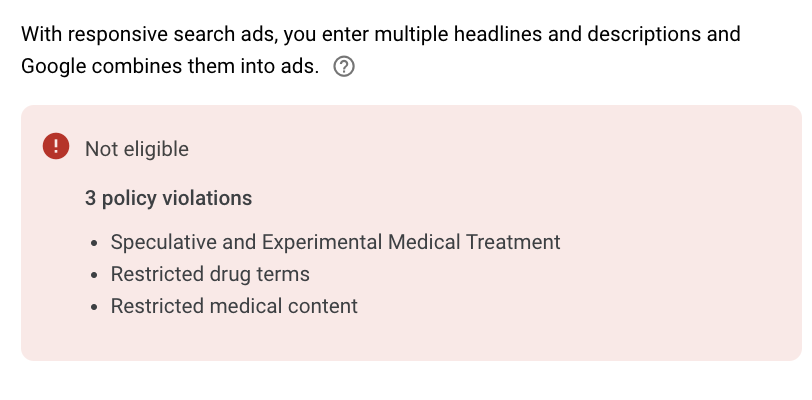
But of course, it’s pretty difficult for someone to keep track of every little detailed policy. And don’t forget, every ad gets reviewed automatically and could therefore be marked automatically. And let’s be honest, we all know that automated systems can make mistakes.
Here are some of the sections of your ads that could get flagged:
- Ad text, which could include both the ad headline and meta description copy.
- Landing pages, which could be flagged due to both visual and textual components.
- Ad targeting, which if done improperly with respect to the content, could be seen as offensive.
Why Would Google Disapprove Your Ads?
The answer is pretty broad, but if we could give you a general response, it’s because Google is a stickler for rules.
In the case of your ad text getting disapproved, this basically occurs because your content violates their policy in some way. This doesn’t even mean you’ve put something offensive in, it could also just mean that you’ve made a misstep, like using a trademarked term.
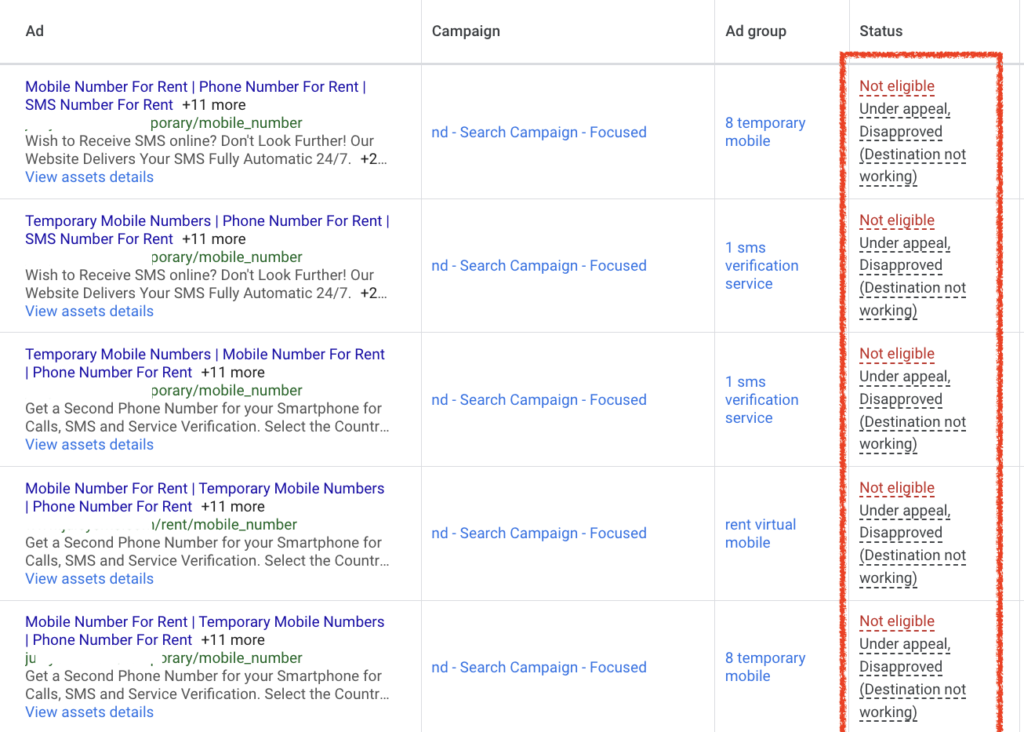
Sometimes, your ad destination URL could be broken which means your landing page doesn’t get delivered. Again, this is something totally innocuous, but it’s totally enough to get your ad campaigns suspended.
These are just a few examples, let’s go deeper into these issues and how you can fix them.
Content-Related Issues
Trademarks and Copyrighted Content
Piggybacking on your competitors’ brand names to run ads is a pretty common tactic.
But there’s a point where you can take it too far, and that point is where you start using trademarked names in your content.
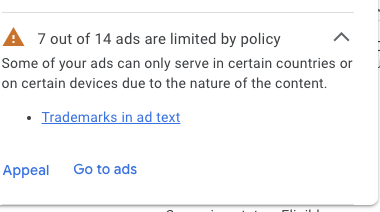
Pretend you’re a reseller of iPhones and you run ads targeting keywords like “Apple phone”. Naturally, you decide to run ads with copy like “Refurbished Apple iPhone 12, 20% off for a limited time.”
That’s not allowed.
If you were an authorized Apple Re-seller, then this would be a different story. But there would still be hoops for you to jump through to prove it. Apple and iPhone are trademarked terms in this case, and you’ve just used them in your ad. That contravenes Google’s policies and you’ll rightfully be banned.
Of course, there are situations where there is more nuance. And in those cases, you can appeal in the following ways:
- Show that you have permission from the brand to use their name.
- Show that your brand has nothing to do with the trademarked one and you are not attempting to compete with them or hijack their brand in any way. (This is a tough one)
So instead, you will likely need to change your ad copy around to use more generic terms. Or, you might want to switch the focus of your ad to discuss your own selling points instead of those of your competitors.
Misrepresentation leads to Google Ads disapproved by Google
Have you ever clicked on an ad or a page thinking “Oh wow, I can’t wait to see what they have in store.”
And then you get there and you search high and low, only to miss the thing that brought you to that page in the first place. In this situation, you probably feel deceived, and you would also be less likely to click on ads both in general and from that brand in the future.
Google has seen this and wants to clamp down on it. Any ad that ruins the search experience also damages Google just a little bit.
So, make sure that your ads don’t make any false promises. Let’s say that you’re selling a weight loss product. If you run an ad with a headline like “The secret medical cure that 9/10 doctors don’t want you to know about” you’re almost guaranteed to get your Google Ads disapproved by Google.
Especially if when you land on the page, you’re just taken to a generic page with a few health products, and no reference to any “secret medical cure”.
So make sure that you avoid stretching the truth in your ad copy, and if you’re going to make a tantalizing offer, you better back it up directly on the target site.
Technical Issues
Destination URL Issues
This one is pretty simple.
Sometimes, links on your site break. It happens to the best of us.
But when it happens, ensure that you fix it right away. Otherwise, your ads will be removed.
There’s also another way to trigger Google’s rules, and that’s with a particular issue. Basically, whenever you create an ad group, you need to ensure that the destination URL is always the same.
So for instance, if you’re running multiple ads for cardigans and you have these two keywords as part of the same ad group:
- “Cardigans for autumn” with the destination URL as “mystore.com/fall-collection/cardigans“
- “Blue cardigans” with the destination URL as “mystore.com/cardigans/filter=?blue“
Your ad would get suspended because you’re linking to completely different destination URLs. The point is that Google expects all ads within an ad group to be similar so that they can confidently show it to everyone in that audience. But if the URL changes, then Google gets a little suspicious.
The final way that your website could cause issues is if you’ve blocked Google’s crawlers. In this case, Google will assume that you are deceiving them and immediately flag your website. Evidently, this isn’t always done as a deceptive practice, but Google still needs to crawl your website to evaluate the relevance of your ad.
Capitalization and Punctuation Issues
20% OFF CUSTOM CARDIGANS!!!
That sounds like a really enticing offer, but it’s a bit spammy, so Google has taken steps to block ad copy like this. Especially in the headline.
The issue isn’t that there’s a sale; every store runs sales. Rather, the issue here is that you’ve capitalized the entire sentence and added 3 exclamation points at the end. This type of thing is gimmicky and excessive.
Here’s a better headline you can use to replace that one:
Find your new Fall fit. Explore custom cardigans only 20% off.
Another one to avoid is using symbols as bullet points or separators. For instance,
***Find your new Fall fit*** Explore custom cardigans only 20% off,
would also get banned.
Landing Page Issues
Ad and Landing Page Mismatch
We talked about this a bit before with the misrepresented ads. But in this case, the landing page itself, more likely out of error than malice, doesn’t match up with the ad.
Even though it could be an error, Google wants to clamp down on this. Any ad that ruins the search experience also damages Google just a little bit.
So, make sure that your ads don’t make any false promises. You might have a clothes store that sells cardigans, but you only sell in neutral colours like gray, black, brown, and blue.
Yet, you still run ads targeting “red cardigans” and your ad copy is dynamic too, so your ad says something like “High-quality fabrics, check out our red cardigans”.
Anybody who clicks on that ad is likely going to navigate a bit on your site, notice that no red cardigans are available, and bounce. This type of activity might get flagged.
So basically, a large part of keyword targeting isn’t just about finding the right keywords that could make you money, it’s also about narrowing your ads down to the specific audience that also wants your product. It could seem tempting to make big promises in your ads, but it’s unethical to make false ones.
Landing Page Quality
Landing page quality is always a pretty big factor when it comes to ranking websites. But it’s actually possible to do the landing pages so badly that Google disapproves your ad.
One of the biggest issues that seems to pop up (no pun intended) is on mobile. If you click an ad on mobile and you have a pop-up that covers the entire page, you’re creating a bad user experience. Google’s bot will automatically detect this, and without context, it can be a little disconcerting.
You might also have other distracting elements on your landing page that completely ruin the page experience. Things like flashing ads or other intrusive designs are best left off such pages. If something looks odd to you, don’t include it.
Finally, if you failed to secure your landing page properly, and it got hacked somehow, Google might recognize that the experience changed and shut you down for the time being. They have special detection methods that allow them to see when something happened. That will trigger a manual review, where they’ll be able to establish that your page got hacked by malicious software.
Prohibited Content
Violent Content & Sensitive Events
How far is too far? Basically, once you start taking advantage of major events in the news, you’re going to be in the wrong place with Google Ads. It might seem like a quick tactic to get more clicks, but Google will view it as a cheap trick.
And don’t try to bury it in your ad copy either. This is less likely to get flagged automatically, but more likely to cause offense to a potential customer, who could eventually report you.
The other thing is not to use inappropriate words in your copy and graphic visual content in your images. Again, there is a fine line here. Advertising a bikini in a bikini advertisement is expected. But if such an image is placed on a landing page for children’s toys,
Be Careful About Certain Industries
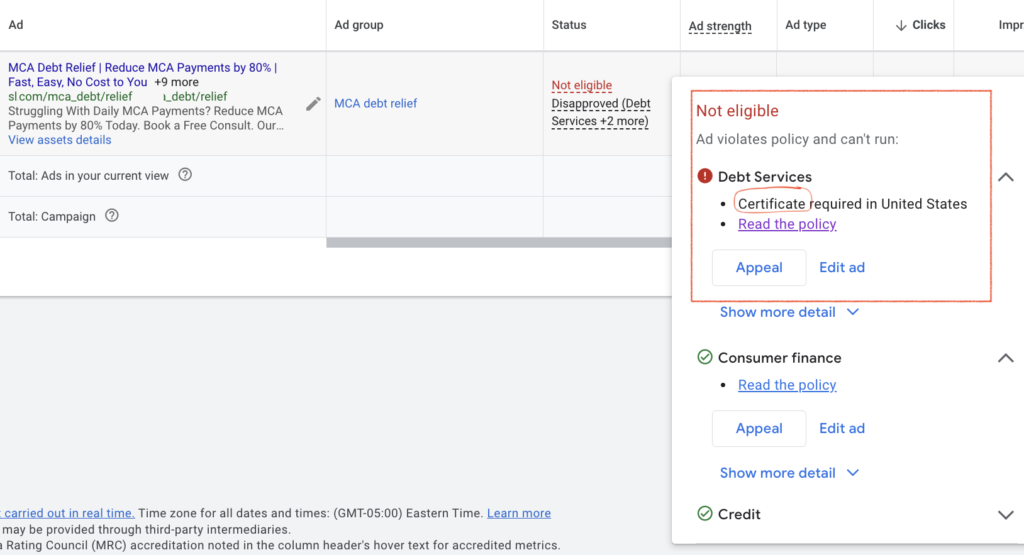
With some industries, you need to be extra cautious about how you proceed. You can’t just say whatever you want about any product, because it could literally be a matter of life or death. Here is a brief rundown of industries where you need a more “delicate touch”.
- Healthcare and medicine
- Gambling and betting
- Financial services and products
- Politics
- Alcohol & Tobacco
The first 3 are usually the most common ones. Let’s talk about them in more detail.
First off, with healthcare, you need to be recommending those that have been approved in the country you’re advertising in. Make sure that you’re checking ahead of time whether these medicines are approved in your jurisdiction.
Furthermore, you shouldn’t make misleading claims about the medicines. We discussed it earlier, but it bears repeating. Just say what the medicine does, don’t try to put a spin on it.
Now, with gambling, similar rules apply. You should be very careful about which jurisdictions you decide to advertise in. Otherwise, your ad could get pulled. And pay attention to the rules on how to advertise gambling because they can vary from province to province and state to state.
Finally, there are financial services and products. Anything related to cryptocurrency is highly regulated and a minefield when it comes to breaking ad regulations. That said, the financial field is diverse and there are a lot of different products, insurance being one, that are advertised in very normal ways.
You have to take care that your landing pages don’t exaggerate any aspect of the services here. Only make guarantees that you can back up with numbers and facts. Moreover, don’t target any vulnerable groups.
Hyper-Personalization
It’s one thing to target your ICP and write ads that speak to your audience in their voice. Obviously, Google encourages this. The more people that click on your ads, the more money Google makes.
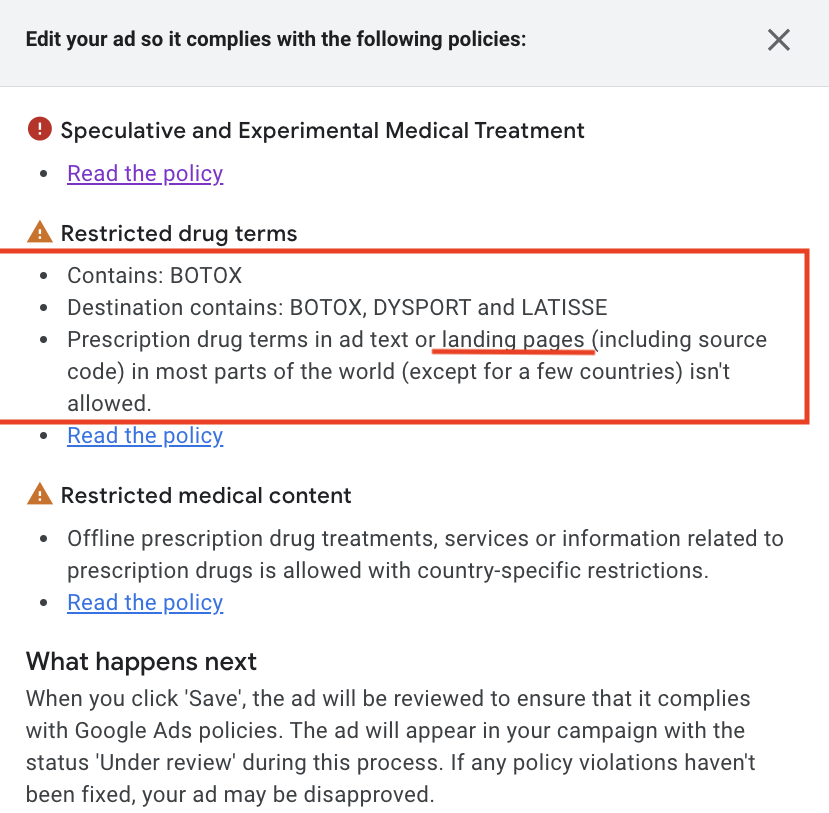
But it’s quite another thing to hyper-personalize to the point that you use someone’s sensitive personal information to target them. In fact, many would find it offensive.
An example of this might be trying to match stereotypes of a certain sexual orientation, religious belief, or race to a particular product. Using such stereotypes in your ad copy to attempt to attract buyers is not only offensive but also against Google’s terms of service. Google wouldn’t want to be seen as endorsing hateful speech and practices.
Another one would be to use a personal condition, like a mental illness, to target people. An ad title like, “These self-help books will cure your depression” is extremely insensitive and does more harm than good.
That said, there are some gray areas when it comes to targeting particular health conditions. Case in point, some diabetes medications could be particularly helpful to those who suffer from it. And as long as your ad copy is written with sensitivity, and without exaggerating any particular symptoms of the illness or features of the drug, you should be in the clear.
In general though, instead of trying to lean on stereotypes or scare people into buying your product, you should have a positive voice. Speak about your buyers’ problems in terms that are general enough not to pick on any specific group of people. There are plenty of viable ways to connect with your audience.
Circumvention
Cloaking
Cloaking is a seriously malicious way to misrepresent your offerings to Google. Basically, as we mentioned earlier, you always submit a target link for your ads to Google. Google’s bots will then crawl it to ensure that everything adheres to their policies.
The thing is though, Google has its own IP addresses that are known to the public. And it’s very easy to adjust a website dynamically based on IP address. How do you think location settings work?
You might be starting to catch on. Nefarious actors will present one version of a landing page to Google, adjusted based on IP address. That one will be completely clean and trigger no alarms. Meanwhile, a different version could be shown to everyone else that could contain any of the misleading or harmful things that we’ve mentioned earlier in this article.
Dynamic Landing Pages
We can think of issues related to dynamic landing pages as “accidental cloaking”. Sometimes, you implement dynamic landing pages for good reasons. As we mentioned earlier, it makes sense to show a different landing page from state to state and province to province.
But sometimes, Google will eventually detect this inconsistency and mistake this for some kind of cloaking tactic. You obviously don’t want them to think that. Make sure that the pages that you’re serving to users are consistent when you’re using them in Google Ads.
How Can You Appeal a Google Ads Disapproval?
First things first, don’t start the appeal without having some sense of what the issue could be. Go to your Google Ads account and comb through every aspect of your ad, including ad text, ad extensions, and landing pages, to figure out where you’re seeing issues. And if you’re tech-savvy, it would be a good idea to take a look at the code too.
Use your judgment, if you really think that your site comes out clean, then by all means, appeal Google’s ruling.
Best Practices for Putting Together a Worthy Google Ads Appeal
If you’re not sure how to conduct your appeal, here are some best practices.
Gather Evidence: You can’t make a case without it. Seek to understand why your Google Ads are disapproved and then provide evidence to the contrary. Make sure that you’re directly addressing the ban.
Keep Track of Changes You Made: You might have addressed minor problems with your ad. Be sure to document each of these changes and let Google know.
Be Professional: It’s easy to get wrapped up in the moment, but make sure that you keep your communications courteous when you contact Google support. Don’t dig your hole even deeper.
Best Practices for Preventing Google Ads Disapprovals
In the future, your prevention needs to start before the mistake is even made. Here are some good principles for you to follow:
- Don’t do anything that makes you uncertain. We’ve already walked you through a bunch of potential scenarios where your ad could get disapproved, If your situation sounds similar, then it’s better to be cautious.
- Keep tabs on your target pages so that you know that the URL isn’t being changed. Additionally, this is a good way to monitor for hacks.
- Don’t put all your eggs in one basket. Make sure you have other revenue channels for your business so that your finances aren’t ruined when Google Ads go down.
Work With New Digital To Avoid Disapproved Ads
While a lot of the mistakes related to Google Ads disapproved by Google are easy to make, they’re also easy to avoid. A seasoned Google Ads professional is less likely to run into such problems.
If you have any questions about why your ads are getting disapproved, then reach out to us. We’ll help you unpack the reasoning behind why it’s happening, come up with a more reliable strategy for your ads and work with the Google’s ad approval team fix the issues.
